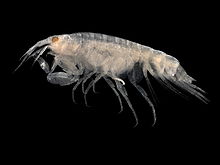Leucothoidae
Appearance
| Leucothoidae | |
|---|---|

| |
| Leucothoe incisa | |
| Scientific classification | |
| Kingdom: | |
| Phylum: | |
| Subphylum: | |
| Class: | |
| Order: | |
| Suborder: | |
| Family: | Leucothoidae |
| Synonyms [2] | |
|
Anamixidae Stebbing, 1897 | |
Leucothoidae is a family of amphipods. It contains 138 species in 5 genera:[3]
- Anamixis Stebbing, 1897 – 21 species
- Leucothoe Leach, 1814 – 98 species
- Nepanamixis Thomas, 1997 – 4 species
- Paranamixis Schellenberg, 1938 – 13 species
- Paraleucothoe Stebbing, 1899 – 2 species
Males undergo a profound transformation when they reach sexual maturity, turning from the "leucomorph" state to the "anamorph" state. Before this transformation was recognised in 1983,[4] females and immature males were described in the genus Leucothoides (Leucothoidae), and mature males were described in the genera Anamixis, Paranamixis and Nepanamixis (Anamixidae). The genus Leucothoides may still be used for leucomorphs of species whose anamorph has not yet been identified.[2]
References
- ^ "Leucothoidae". Integrated Taxonomic Information System.
- ^ a b J. K. Lowry, P. B. Berents & R. T. Springthorpe (October 2, 2000). "Australian Amphipoda: Leucothoidae". Australian Museum. Retrieved May 22, 2010.
- ^ Kristine N. White & James Darwin Thomas (2009). "Leucothoidae" (PDF). Zootaxa. 2260: 494–555.
- ^ James Darwin Thomas & J. Laurens Barnard (1983). "Transformation of the Leucothoides morph to the Anamixis morph (Amphipoda)". Journal of Crustacean Biology. 3 (1): 154–157. doi:10.2307/1547860. JSTOR 1547860.
